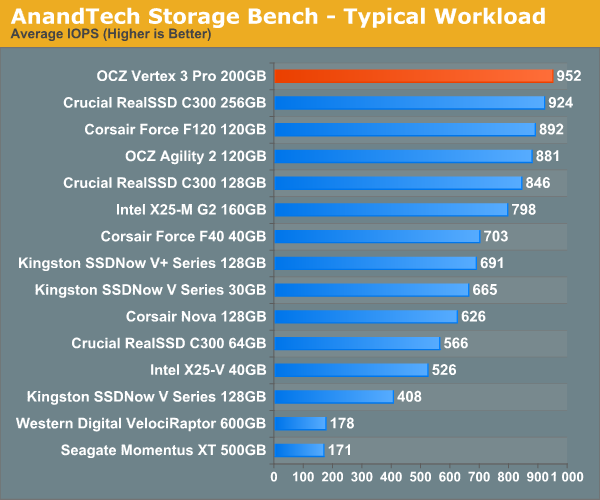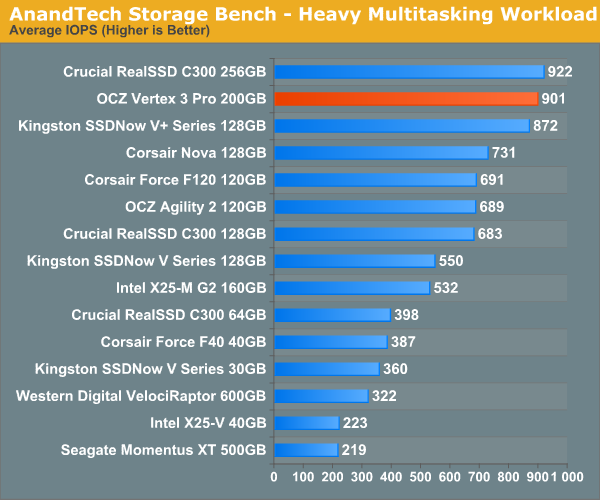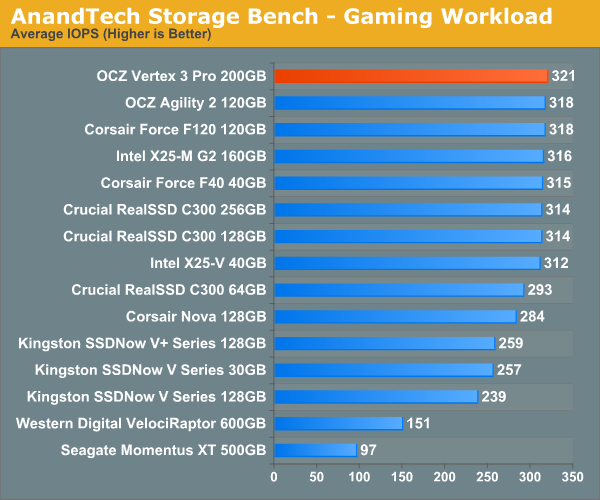OCZ Vertex 3 Pro Preview: The First SF-2500 SSD
by Anand Lal Shimpi on February 17, 2011 3:01 AM ESTAnandTech Storage Bench 2010
To keep things consistent we've also included our older Storage Bench. Note that the old storage test system doesn't have a SATA 6Gbps controller, so we only have one result for the Vertex 3 Pro (and the C300). The SF-2500 controller does respectably here, but with a 3Gbps controller we're only marginally faster than other SSDs (which is why we've moved to a new storage platform for 2011).
The first in our benchmark suite is a light/typical usage case. The Windows 7 system is loaded with Firefox, Office 2007 and Adobe Reader among other applications. With Firefox we browse web pages like Facebook, AnandTech, Digg and other sites. Outlook is also running and we use it to check emails, create and send a message with a PDF attachment. Adobe Reader is used to view some PDFs. Excel 2007 is used to create a spreadsheet, graphs and save the document. The same goes for Word 2007. We open and step through a presentation in PowerPoint 2007 received as an email attachment before saving it to the desktop. Finally we watch a bit of a Firefly episode in Windows Media Player 11.
There’s some level of multitasking going on here but it’s not unreasonable by any means. Generally the application tasks proceed linearly, with the exception of things like web browsing which may happen in between one of the other tasks.
The recording is played back on all of our drives here today. Remember that we’re isolating disk performance, all we’re doing is playing back every single disk access that happened in that ~5 minute period of usage. The light workload is composed of 37,501 reads and 20,268 writes. Over 30% of the IOs are 4KB, 11% are 16KB, 22% are 32KB and approximately 13% are 64KB in size. Less than 30% of the operations are absolutely sequential in nature. Average queue depth is 6.09 IOs.
The performance results are reported in average I/O Operations per Second (IOPS):

If there’s a light usage case there’s bound to be a heavy one. In this test we have Microsoft Security Essentials running in the background with real time virus scanning enabled. We also perform a quick scan in the middle of the test. Firefox, Outlook, Excel, Word and Powerpoint are all used the same as they were in the light test. We add Photoshop CS4 to the mix, opening a bunch of 12MP images, editing them, then saving them as highly compressed JPGs for web publishing. Windows 7’s picture viewer is used to view a bunch of pictures on the hard drive. We use 7-zip to create and extract .7z archives. Downloading is also prominently featured in our heavy test; we download large files from the Internet during portions of the benchmark, as well as use uTorrent to grab a couple of torrents. Some of the applications in use are installed during the benchmark, Windows updates are also installed. Towards the end of the test we launch World of Warcraft, play for a few minutes, then delete the folder. This test also takes into account all of the disk accesses that happen while the OS is booting.
The benchmark is 22 minutes long and it consists of 128,895 read operations and 72,411 write operations. Roughly 44% of all IOs were sequential. Approximately 30% of all accesses were 4KB in size, 12% were 16KB in size, 14% were 32KB and 20% were 64KB. Average queue depth was 3.59.

The gaming workload is made up of 75,206 read operations and only 4,592 write operations. Only 20% of the accesses are 4KB in size, nearly 40% are 64KB and 20% are 32KB. A whopping 69% of the IOs are sequential, meaning this is predominantly a sequential read benchmark. The average queue depth is 7.76 IOs.











144 Comments
View All Comments
abrar - Friday, February 18, 2011 - link
"In this particular drive the user (who happened to be me) wrote 1900GB to the drive (roughly 7.7GB per day over 8 months) and the SF-1200 controller in turn threw away 800GB and only wrote 1100GB to the flash. This includes garbage collection and all of the internal management stuff the controller does."how did you calculate this data ?
have you used any special software?
douglaswilliams - Friday, February 18, 2011 - link
Anand,Will these very fast read rates speed up virus scans?
Thank you for being technical and thorough,
Douglas
Qapa - Saturday, February 19, 2011 - link
ALL disk reads are this fast, so of course this will have an impact in virus scanning.But mostly, it will have an impact that your system is faster, although those resource hogs (virus scanning programs) are running - and yes, their bottleneck were reading the files from the disk.
semo - Saturday, February 19, 2011 - link
I've noticed that MSE is mostly limited by CPU and it isn't multithreaded so even worse notebooks where the CPU freq. might be lowerjoeld - Friday, February 18, 2011 - link
I don't believe any of the SF-1200 makers actually supported encryption on the drive, so the password was basically blank. Are the folks bringing the SF-2500 to market actually going to support disk passwords so that full-disk encryption requirements for laptops will be met? Software based full disk encryption is just too slow and flawed when paired with SSD drives...faster - Saturday, February 19, 2011 - link
Props to OCZ for leading the performance market on multiple levels.Looking at the prices of these new high performance SSDs, including the upcoming offerings from Intel, the OCZ Revodrive X2 is looking like a value. With Revodrive's read/write of 740/720, even this next generation of drives doesn't even come close. Now that newegg sells the 240GB x2, on sale, for $540 ($679 not on sale), it is a better bang for the buck than the new drives. The revodrive is a product that has been out for a while and is available right now. If you have the open PCIe slot, it seems like a no-brainer to pick the X2.
croc - Sunday, February 20, 2011 - link
Sadly, (well maybe not so sadly) we Aussies are not allowed gun ownership. There are exceptions, but generally not... So the final conclusion, "2011 may be the year to finally pull the trigger." does not really apply. However, maybe the right year to finally purchase an SSD, time (and further testing) will tell.MamiyaOtaru - Monday, February 21, 2011 - link
time doesn't "tell" anything. It's an abstract concept. I mean if you're going to take issue with idioms..Qapa - Sunday, February 20, 2011 - link
It would also be interesting to have in the benchs:- 1 "normal" 7200 HDD
- 1 "normal" 5400 laptop HDD
This would be interesting to compare since, most people do not own Velociraptors and this way we would be able to better know the system improvement on buying an SSD, and convincing other people - like our bosses - to upgrade our computers at work as well :)
compvter - Monday, February 21, 2011 - link
@faster Thats because they have two (old) sf controllers in the card. Think about the speeds they get with two of these (sf-2000 family) i would guess it will be around 1GB/s (read&write). At least current revodrives lack trim support so, that might be deal breaker for some ppl.